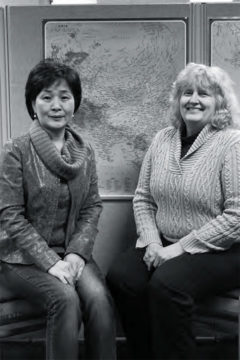UW-River Falls partners with South Korean village
February 11, 2015
Starting this semester, UW-River Falls officially has a partnership with a university in South Korea that teaches students the English language as well as U.S. culture.
UWRF recently partnered with Yeungjin College to establish the Daegu Gyeongbuk English Village (DGEV). The village is located northwest of the city of Daegu, South Korea, which is the fourth largest city in South Korea.

The purpose of DGEV is to teach students, ranging from kindergarten to adult, the English language and the proper way to act in western cultures. Youngsoo Margolis, the director of the South Korean partnership, said the main purpose of the village is to expose students to English and provide them with authentic experiences.
The village was started by the government as an effort to bring English education to South Korea.
“It’s a part of the government’s effort to provide English education and English exposure to people who can’t afford to study abroad,” Margolis said.
The village opened in 2007. There are three main academic buildings: the main building, the "situational" building and the "creativity" building. There is also a dormitory for teachers and students on the campus, with a grand-total of 101 classrooms. The enrollment in 2007 was 2,907, and has rapidly increased to 33,634 students in 2013, with many more universities and organizations around the world taking part during that time.
Students can practice what they’ve learn in mock scenarios in the "situational" building. There are a total of 22 different situational scenarios in the building. The situational scenarios range from how to act in a grocery store to how to board an airplane.
Students have to know and use the English language for these scenarios, so they have to use the English word for chicken or fruit, for example, said Jane Miller, provost and vice-chancellor for Academic Affairs.
Teachers from all around the world come to the village to teach the students. They work five days a week on a one-year contract. There typically are around 53 English teachers who teach a variety of classes to the students entirely in English.
Teachers are only supposed to speak in English and are not required at all to even know the Korean language. The DGEV is continuously looking for new teachers to teach at the village.
Students typically only attend the program for a short stay, ranging from a few days to a few weeks, depending on the program. Most students stay for five days and four nights while at the village. There are different curriculums and programs depending on the grade and school of the students attending.
Margolis said the village also gets international students, as well, from places like Japan and Guatemala. There also is a wide variety of groups that have visited; even groups like the Girl Scouts have visited the village, according to Miller.
UWRF took over the partnership from the University of Colorado-Colorado Springs in July of 2014. Currently, nobody from UWRF has visited DGEV but there has been increased interest from graduates of UWRF to visit the village.
Margolis is working on being able to bring some of the students from DGEV to UWRF so they can get real experience with the English culture. She also is looking for more involvement from students at UWRF, as there are many study abroad opportunities in South Korea and other ways to get involved.
